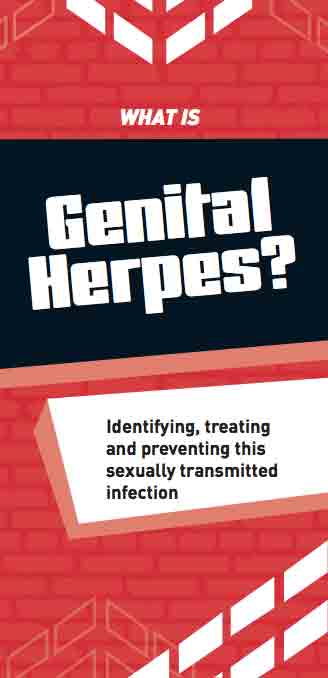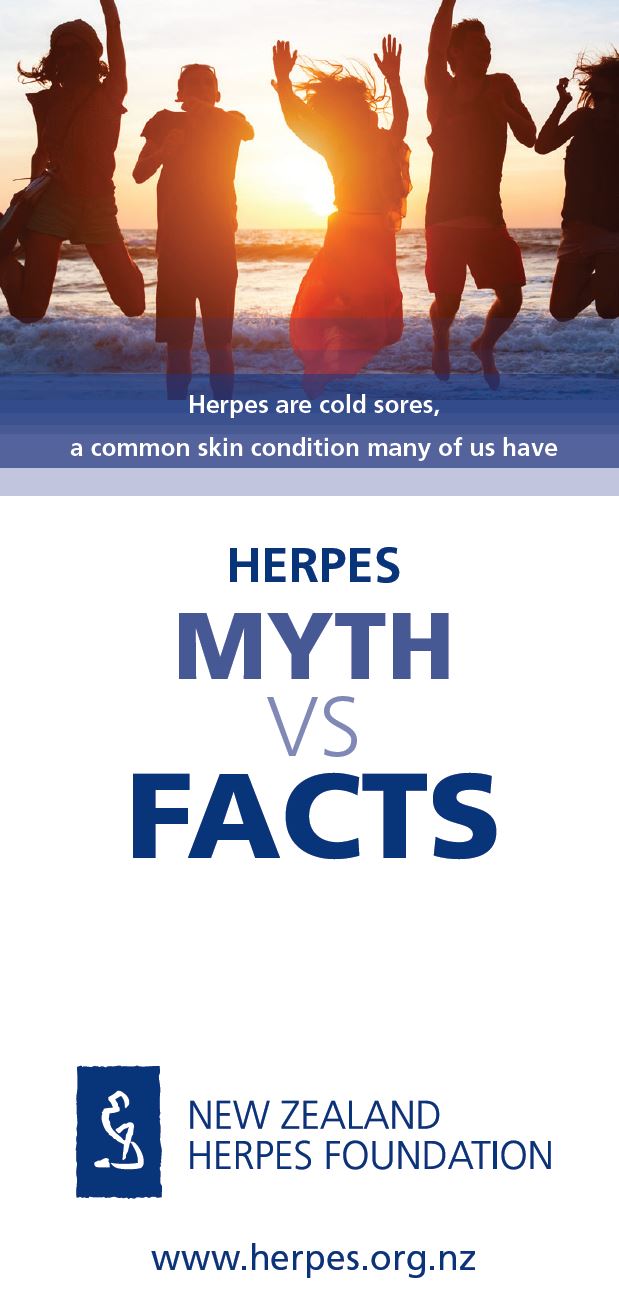Genital herpes
Key points about genital herpes
- Genital herpes is a common skin infection caused by the herpes simplex virus (HSV).
- Most people have mild symptoms or none at all. Others get a painful rash and blisters on their genitals and surrounding skin which can return.
- Genital herpes is usually passed on to others through sex.
- Antiviral medicines are effective for treatment and prevention of flare ups.
- The emotional impact of genital herpes can be worse than the symptoms, so counselling support is available.

Genital herpes is a common skin infection caused by the herpes simplex virus (HSV).
HSV belongs to the family of herpes viruses which also includes the chickenpox virus (varicella zoster) and glandular fever virus (EBV). This family of viruses is so common that up to 9 out of 10 people have at least 1 kind.
There are 2 types of herpes simplex: HSV-1 and HSV-2. As well as genital herpes, HSV-1 can infect your mouth and cause cold sores. HSV-2 only causes genital herpes. HSV-1 and HSV-2 infections look the same and you can only tell them apart by lab testing.
Because genital herpes can be passed to others through sexual contact, it is called a sexually transmitted infection (STI).
As many as 1 in 3 adults in Aotearoa New Zealand has the virus that causes genital herpes. Once you have HSV it stays in your body and can become active again from time to time. It lies sleeping (latent) in a nerve that gives feeling to a particular area of your skin. When it becomes active it travels down the nerve to the skin and starts to grow again.
On average, symptoms of genital herpes are likely to flare up 4 to 5 times in the first 2 years after being infected with HSV. However, over time the virus becomes active less often and each time you get symptoms they're less severe.
Video: Let’s talk herpes
Genital herpes is usually passed on by having skin-to-skin sexual touching (vaginal, oral or anal) with someone who has HSV. You can get genital herpes through direct contact with an infected blister or sore. You can also transmit or get the virus when you or your partner have no symptoms. This is because sometimes there's a small amount of virus in your skin even when you don’t have a rash – this is known as ’viral shedding’.
Most people who infect others don't realise they're passing herpes on.
- About 80% of people with genital herpes don't know they have the virus because they have very mild symptoms or none at all.
- More than 75% of people who have genital herpes get it from people who don't know they have it themselves.
Using condoms reduces your risk of passing on the virus by about half, but doesn't take it away completely. This is because a condom can’t cover all the skin which could have the virus.
You can't catch genital herpes by sharing cups, towels or bath water, or from toilet seats. It can only be spread by close skin-to-skin contact.
HSV has nothing to do with being dirty or having lots of sexual partners. Anyone who has ever had any kind of genital touching can have HSV.
If your sexual partner has just been diagnosed with genital herpes, it doesn’t mean they had sex with someone else or had lots of sexual partners in the past.
- Your partner may have caught genital herpes from you. You can carry the virus without knowing you have it as some people have no symptoms.
- Your partner could have caught the virus from a cold sore on your mouth or face during oral sex. The virus can be passed on even if you don't have a cold sore at the time of contact.
- Your partner may have got the virus from a previous sexual partner, even several years ago. The virus can be inactive in your body for a long time before you get your first rash.
HSV that causes genital herpes doesn't cause cervical cancer. That’s human papillomavirus (HPV) – similar name, different virus.
The most common symptom is none at all.
First infection
If you do have symptoms the first infection is usually the worst. You might:
- feel generally unwell
- have a fever (high temperature)
- have a headache
- be able to feel lymph nodes (glands) in your groin
The rash comes up as 1 or more small blisters with a red base on your penis, vulva, vagina or cervix. The blisters then become painful ulcers (sores) which can last for 2 to 3 weeks. The rash doesn’t scar.
The rash can also be on your anus, inside your rectum, on your buttocks or on the tops of your thighs. It can be painful to pee if the rash is around the opening to your bladder (your urethra).
Flare-ups
You might never have another flare up, but if you do it will usually be less severe. It might even be so mild you don’t notice, or you wonder if it’s really anything at all.
A recurrence (flare up) might start with itching or burning for a few hours. Then the rash usually comes up in the same general area as the first time, but the blisters are smaller and less spread out. A recurrence is usually shorter, lasting 5 to 10 days. Expect to feel well in yourself – there should be no problem going to work.
Most of the time there isn’t a reason, but some things can trigger a recurrence. For example:
- damage to the skin
- other infections
- sun
- emotional stress
- your menstrual cycle (just before your period).
VIDEO: Genital herpes – Marian's story
Marian got herpes from her boyfriend. She talks about the symptoms, how it can be treated, and discussing herpes with your partner.
The rash of genital herpes is easily diagnosed by your GP, nurse practitioner or sexual health clinic. It's likely they'll take a swab to send to the lab to confirm this. Occasionally the rash might look like a different skin problem, if this happens you might need other tests.
If you don’t have a rash, your healthcare provider can give you a swab to take home to do yourself the next time the rash appears.
Even if there is no rash, talking through what you've noticed can help you and your healthcare provider decide if genital herpes is likely and what to do about it.
It’s a good time to have a check for other STIs too, because it’s common to have more than 1. Read more about sexually transmitted infections (STIs).
Genital herpes is best treated with antiviral tablets, which stop the herpes virus from multiplying.
Antiviral medicines taken by mouth, such as valaciclovir or aciclovir, are the most effective for symptoms. The medicine only works while you're taking it. The infection can come back when you stop taking it. These medicines don't cure genital herpes.
Antiviral tablets are used in 2 ways:
- To treat flare-ups as they happen (episodic treatment): The aim is to shorten the time each flare-up lasts and to relieve symptoms. They work best when taken as soon as you get symptoms and before the blisters appear. Your healthcare provider can give you a prescription for a supply to keep at home.
- To prevent or reduce recurrences (preventative or suppressive therapy): If you get frequent or severe flare-ups, your healthcare provider may recommend that you take antiviral tablets every day to help prevent these. Suppressive therapy is taken continuously, every day for at least 6 months. Suppressive antiviral therapy may help reduce viral shedding, which lowers the chance of passing the virus to sexual partners.
Antiviral creams bought over the counter from the pharmacy aren't recommended as they don't work well.
Simple treatments for the relief of discomfort
- Wear a skirt or lavalava. If you have to wear underwear, make them loose cotton ones.
- Use saline solution on a soft cloth to soothe the area. To make a saline solution, use 1 teaspoon of salt in 600 mL of water or half a cup of salt in a bath.
- Don't use scented soaps, bubble bath, etc, as these can be irritating.
- Using a hairdryer on its lowest setting to dry your skin may be more comfortable than using a towel.
- Pain relief medicine such as paracetamol and ibuprofen. Check with your pharmacist or other healthcare provider whether taking these is suitable for you.
- Ice wrapped in a face cloth and put on the sores for 5 to10 minutes may be soothing. Don't put ice directly on the sores as this can cause ‘ice burn’.
If you find peeing painful:
- Pee in the shower or sitting in a warm bath.
- Use a pump bottle full of water and spray water on yourself while you pee.
- Try putting Vaseline on the area.
- You can also try lignocaine 2% gel on the painful area. It’s not funded by the government, but you can buy it over the counter at your pharmacy. You can put it on 5 minutes before peeing, and it should only be used for 1 to 2 days.
- Drink plenty of fluids as this dilutes your pee and helps reduce the stinging.
If you've just found out that you have genital herpes, it's likely you'll have a lot of questions. A diagnosis of genital herpes often comes as a shock.
For many people who have genital herpes, the emotional stress is worse than the physical symptoms. There are lots of myths about genital herpes, which makes having ‘cold sores down below’ harder than it needs to be.
Seeing a counsellor can be a good idea to discuss any worries.
For more information see the NZ Herpes Foundation(external link) or talk with one of their trained counsellors on 0508 11 12 13 (free call, landline only) or 09 433 6526 (9am–5pm, Monday to Friday).
Video: Diagnosed with herpes? 3 things you should remember
This video might help you understand more about the emotional impact of being diagnosed with herpes and what could help.
There are a few times when genital herpes can be more serious. One is if you get genital herpes for the first time when you’re pregnant, especially if you’re near to giving birth. Herpes simplex infections in newborn babies can be very dangerous. If this applies to you, contact your Lead Maternity Carer immediately. If you have genital herpes and you have a female partner who doesn’t have genital herpes and is pregnant or you’re planning a pregnancy, make an appointment to discuss this with your healthcare provider.
There are also some rare complications of HSV infections in adults. If you or someone you're caring for has a genital herpes rash and is confused or has a different rash on another part of their body, make an urgent appointment to see your healthcare provider.
When you know about genital herpes and have the right treatment handy you’re on the way to this becoming just another part of caring for yourself. You’ll probably want to think about talking with sexual partners(external link) you have now and in the future.
People with genital herpes:
- have normal fertility
- are not at greater risk of cancer
- can donate blood
- can work in any job
- have the same health, immune system function and lifespan as people who don’t.
Genital herpes – the facts(external link) NZ Herpes Foundation
Herpes myths vs facts(external link) NZ Herpes Foundation
Recognising genital herpes(external link) NZ Herpes Foundation
Herpes and relationships(external link) NZ Herpes Foundation
Herpes in pregnancy(external link) NZ Herpes Foundation
Images of genital herpes(external link) DermNet, NZ
Genital herpes(external link) NHS, UK
Genital herpes(external link) Healthy Sex, NZ
Resources
What is genital herpes?(external link) HealthEd, NZ
The facts – a guide for people with herpes simplex [PDF, 597 KB] The New Zealand Herpes Foundation
Herpes myth vs fact [PDF, 260 KB] The New Zealand Herpes Foundation
References
- The key facts about herpes(external link) NZ Herpes Foundation
- Genital herpes(external link) DermNet, NZ, 2015
- Genital herpes simplex virus(external link) Aotearoa New Zealand STI Management Guidelines for use in Primary Care, NZ
- Genital herpes(external link) Auckland Community HealthPathways, NZ, 2022
Genital herpes is not a notifiable disease. Contact tracing is not recommended.
Genital herpes images(external link) DermNet, NZ
Genital herpes simplex virus(external link) Aotearoa New Zealand STI management guidelines for use in primary care, NZ
It can happen to anyone – first diagnosis of genital herpes(external link) The New Zealand Herpes Foundation, NZ – helpful consultation guide
Brochures

HealthEd, NZ, 2020

The NZ Herpes Foundation, 2017

New Zealand Herpes Foundation, 2017
Credits: Healthify editorial team. Healthify is brought to you by Health Navigator Charitable Trust.
Reviewed by: Dr Emma Dunning, Clinical Editor and Advisor
Last reviewed:





